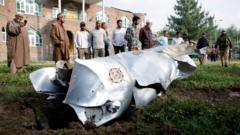Myanmar is facing a dire humanitarian crisis as airstrikes from the military junta continue to intensify, despite a recent earthquake that has left thousands dead and many trapped under debris. The United Nations has condemned these bombings as "outrageous," calling for an immediate halt to military operations and for international actors to pressure the junta. The earthquake, which struck the Sagaing region, was followed by reports of destruction in major cities and widespread loss of life, leading opposition forces to announce a temporary pause in offensive operations. The situation remains critical.
Myanmar Military Junta Continues Bombardments in Wake of Earthquake

Myanmar Military Junta Continues Bombardments in Wake of Earthquake
Myanmar's military sharply escalates airstrikes amid rescue efforts following devastating quake that has claimed over 1,600 lives.
Myanmar’s ongoing conflict has taken a devastating turn following a major earthquake that has resulted in more than 1,600 fatalities, according to reports. Images from regions such as Naung Lin Village in Shan state show significant damage, as the junta continues its aerial bombardments even during a critical time for rescue efforts.
The UN has labeled these actions as "completely outrageous and unacceptable." Special Rapporteur Tom Andrews described the junta's decision to sustain bombings as "incredible," asserting that there is no justification for military operations while people are in desperate need of aid. He urged international actors to press the military regime to cease its violent campaign.
Reports indicate that pro-democracy groups, engaged in a longstanding conflict to oust the junta, have documented sustained airstrikes in the Sagaing region—epicenter of the disaster—as well as assaults near the Thai border. The National Unity Government, formed to represent the deposed civilian administration, has declared a two-week halt to offensive operations in earthquake-affected areas, although defensive actions will continue.
The 7.7 magnitude earthquake, felt across neighboring countries, has raised alarms regarding infrastructure destruction not only in Sagaing but also in Mandalay and Nay Pyi Taw. The junta has confirmed the rising death toll and that numerous people remain trapped beneath rubble.
This earthquake follows nearly four years of civil unrest ignited by a military coup in February 2021, dramatically escalating the conflict across the nation. After four tumultuous years, the military command officially holds control of less than 25% of the country, plagued by defeats and resistance, where aerial attacks have become essential to maintaining power.
Human rights violations by the junta during these air operations have come under scrutiny, with civilian areas, including schools and medical facilities, repeatedly targeted. The international community, particularly the UN, continues to highlight these actions as potential war crimes.
International support for the junta from allies like Russia and China complicates the military’s humanitarian response. While these nations have sent aid and rescue teams, rights advocates caution against misplaced trust, highlighting that the same governments are also supplying the junta with arms.
As the crisis deepens, fears mount that the military could manipulate aid distribution, blocking support to regions controlled by resistance forces. Historical patterns suggest that the junta has used disaster relief as a tactical advantage, obstructing assistance where it is most urgently needed. Observers worry that the public's desperate needs may once again be weaponized in this ongoing conflict.





















